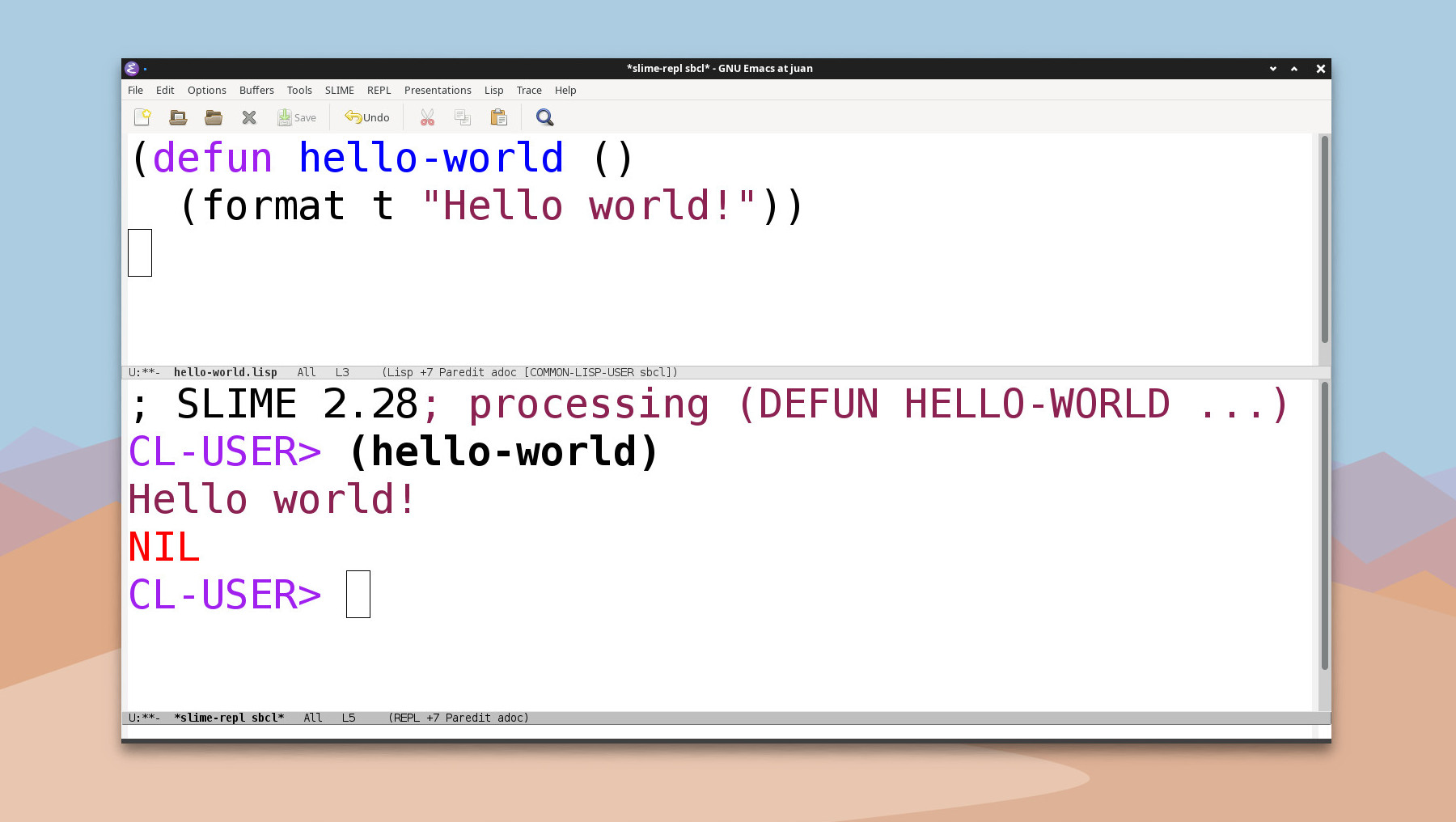
lispEn 2024-01-11 11:11:35
How to install and configure your IDE for Common Lisp (2024)

See on Github
https://gist.github.com/juan-reynoso/31008f67ce335
00af20cb19a4f2b7bbb
Quicklisp is a library manager for Common Lisp. It works with your existing Common Lisp implementation to download, install, and load any of over 1,500 libraries with a few simple commands.
SLIME is a Emacs mode for Common Lisp development. Inspired by existing systems such Emacs Lisp and ILISP, we are working to create an environment for hacking Common Lisp in.
Emacs an extensible, customizable, free/libre text editor — and more.
SBCL is a high performance Common Lisp compiler.
Install SBCL into my Debian 11.5 (x86_64 GNU/Linux)
As super user (root)
1.- Download
wget http://prdownloads.sourceforge.net/sbcl/sbcl-2.2.9-x86-64-linux-binary.tar.bz2
2.-Unpack the tarball
bzip2 -cd sbcl-2.4.0-x86-64-linux-binary.tar.bz2
3.- Change directory
cd sbcl-2.4.0-x86-64-linux
4.- Run install script
./install.sh OR sh install.sh
5.- Into your teminal type sbcl
sbcl
You will see
This is SBCL 2.4.0, an implementation of ANSI Common Lisp.
More information about SBCL is available at .
SBCL is free software, provided as is, with absolutely no warranty.
It is mostly in the public domain; some portions are provided under
BSD-style licenses. See the CREDITS and COPYING files in the
distribution for more information.
*
note: * is the Lisp REPL prompt
Install quicklisp
As your user, not as root
1.- Download quicklisp:
wget https://beta.quicklisp.org/quicklisp.lisp
or
curl -O https://beta.quicklisp.org/quicklisp.lisp
2.- Install quicklisp:
sbcl --load quicklisp.lisp
3.- To continue with the installation, evaluate:
(quicklisp-quickstart:install)
few seconds later you will see
==== quicklisp installed ====
To load a system, use: (ql:quickload "system-name")
To find system
s, use: (ql:system-apropos "term")
To load Quicklisp every time you start Lisp, use: (ql:add-to-init-file)
For more information, see http://www.quicklisp.org/beta/
4.- Test quicklisp:
(ql:system-apropos "postmodern")
5.- Install slime
- into Lisp REPL * prompt evalute:
(ql:quickload "quicklisp-slime-helper")
After few seconds you will see
slime-helper.el installed in "/home/you-user/quicklisp/slime-helper.el"
To use, add this to your ~/.emacs:
(load (expand-file-name "~/quicklisp/slime-helper.el"))
;; Replace "sbcl" with the path to your implementation
(setq inferior-lisp-program "sbcl")
("quicklisp-slime-helper")
6.- Install emacs, emacs-goodies-el and paredit-el into Debian:
aptitude install emacs emacs-goodies-el paredit-el
Now all together, sbcl quicklisp slime emacs for your IDE
Open emacs. Press C-x C-f (C is control). Write ~/.emacs and press enter. Edit .emacs and add:
(setq inferior-lisp-program "sbcl")
;;Load Quicklisp slime-helper
(load (expand-file-name "~/quicklisp/slime-helper.el"))
;;Paredit
(autoload 'enable-paredit-mode "paredit" "Turn on pseudo
-structural editing of Lisp code." t)
(add-hook 'emacs-lisp-mode-hook #'enable-paredit-mode)
(add-hook 'eval-expression-minibuffer-setup-hook #'enable-paredit-mode)
(add-hook 'ielm-mode-hook #'enable-paredit-mode)
(add-hook 'lisp-mode-hook #'enable-paredit-mode)
(add-hook 'lisp-interaction-mode-hook #'enable-paredit-mode)
(add-hook 'scheme-mode-hook #'enable-paredit-mode)
(add-hook 'slime-repl-mode-hook (lambda () (paredit-mode +1)))
(show-paren-mode 1)
Local systems
Quicklisp includes ASDF2. I like to set up ASDF2 to scan a particular directory tree, ~/src/lisp/, for local systems. To do that, I create a config file named ~/.config/common-lisp/source-registry.conf.d/projects.conf that has this in it:
(:tree (:home "src/lisp/"))
The final part is done
Open your emacs and type M-x slime
Making a small Lisp project with quickproject and Quicklisp
https://xach.livejournal.com/278047.html?
Sources
https://www.quicklisp.org/beta/
https://common-lisp.net/project/slime/
https://www.gnu.org/software/emacs/
http://www.sbcl.org/
http://blog.quicklisp.org/
#lisp#commonlisp #ide #programming #development #environment
También te puede interesar

lispmxEn 2017-12-26 12:17:40

lispEn 2022-08-23 21:16:11

informaticsEn 2020-08-03 19:58:21

lispEn 2017-11-29 18:33:02

lisp codeEn 2017-02-22 09:31:04